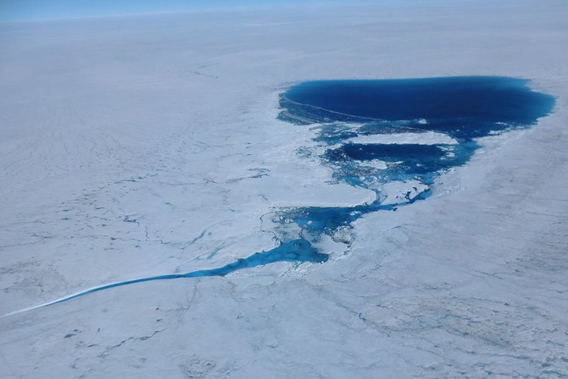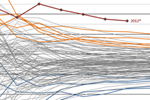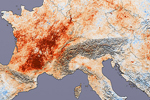
A supraglacial lake over the Greenland ice sheet in the Kangerlussuaq area at 1500 m elevation photographed on July 21, 2012. The lake feeds a stream that will deliver meltwater to the low elevations where it will either flow to the ocean on the surface or it will dive into the ice to contribute to the development of the englacial hydrological system. Photo by: Marco Tedesco.
Four weeks before Greenland’s melting season usually ends, it has already blown past all previous records. By August 8th, nearly a month before cooler weather usually sets in around the world’s largest island, the island toppled the past record set in 2010.
“With more yet to come in August, this year’s overall melting will fall way above the old records. That’s a goliath year—the greatest melt since satellite recording began in 1979,” said Earth and atmospheric scientist Marco Tedesco in a press release.
Tedesco measures the melt in Greenland using microwave satellite sensors, whereby he’s able to track both the total area melting and the number of days.
Just last month NASA announced that 97 percent of Greenland’s massive ice sheet had experienced some melting.
“That event was exceptional in the sense that it was an extremely rare event,” says Tedesco. “Imagine Rio de Janeiro under a layer of snow and you get the idea.”
He notes that while the melt was dramatic, much of the water would not have reached the sea, but instead refroze after a few days.
“We have to be careful because we are only talking about a couple of years and the history of Greenland happened over millennia,” Tedesco notes. “But as far as we know now, the warming that we see in the Arctic is responsible for triggering processes that enhance melting and for the feedback mechanisms that keep it going. Looking over the past few years, the exception has become part of the norm.”
Climate change has warmed the Earth on average 0.8 degrees Celsius (1.44 degrees Fahrenheit) since the early Twentieth Century, a trend that’s expected to continue. However, the Arctic is warming faster than anywhere else on Earth, creating much more visible and dramatic change than in other parts of the world so far. Greenland is a focal point because the melting of its vast ice sheet could raise sea levels catastrophically.
Related articles
July 2012: hottest month in U.S. history

(08/08/2012) Last month was not only the hottest July in U.S. weather history, but the hottest month ever recorded in the contiguous U.S, besting a record struck in July 1936 during the Dust Bowl, according to new data from the National Oceanic and Atmospheric Administration (NOAA). The average temperature last month over the contiguous U.S. was 77.6 degrees Fahrenheit, or 3.3 degrees Fahrenheit above the 20th Century average. Making matters worse, crippling drought continued to spread over 63 percent of the lower 48 states.
Climate and culture: abrupt change and rapid response

(08/06/2012) As the world experiences record heat, increased drought and fires, unprecedented ice melt and similar extreme weather anomalies decades before expected, climatologists have been forced to reconsider previous climate change projections and research techniques. Less than a decade ago, scientific consensus considered warming of more than 2 C and atmospheric levels of carbon dioxide near 450 parts per million (ppm) as acceptable or “safe”. Revised climate science literature and expert opinion now regard safe atmospheric levels of carbon dioxide as below 350 ppm, or less than 1 C rise in average planetary temperature. Many researchers and environmentalists, however, recognize that the present deviation from pre-industrial temperatures of 0.8 C may be unacceptable to prevent runaway climate change and widespread disasters.
Earth’s ecosystems still soaking up half of human carbon emissions

(08/06/2012) Even as humans emit ever more carbon dioxide into the atmosphere, Earth’s ecosystems are still sequestering about half, according to new research in Nature. The study finds that the planet’s oceans, forests, and other vegetation have stepped into overdrive to deal with the influx of carbon emitted from burning fossil fuels, but notes that this doesn’t come without a price, including the acidification of the oceans.
Extreme heatwaves 50 to 100 times more likely due to climate change

(08/05/2012) A recent rise in deadly, debilitating, and expensive heatwaves was caused by climate change, argues a new statistical analysis published in the Proceedings of the National Academy of Sciences (PNAS). Climatologists found that extreme heatwaves have increased by at least 50 times during the last 30 years. The researchers, including James Hansen of NASA, conclude that climate change is the only explanation for such a statistical jump.
(08/02/2012) Tropical vegetation grew along the coast of Antarctica 52 million years ago, an indication to dramatic climate shifts linked to elevated carbon dioxide levels in the atmosphere, report scientists in Nature.
Prominent climate skeptic reverses course, says global warming worse than IPCC forecast
(07/30/2012) After starting his own project to study global warming, a once-prominent climate change skeptic and physicist says he now accepts the reality of anthropogenic climate change. “Last year, following an intensive research effort involving a dozen scientists, I concluded that global warming was real and that the prior estimates of the rate of warming were correct. I’m now going a step further: Humans are almost entirely the cause,” Richard Muller writes in the New York Times as his team, the Berkeley Earth Project, releases a new paper that finds an even stronger link between greenhouse gas emissions and rising temperatures worldwide than the Intergovernmental Panel on Climate Change (IPCC).
Northern Hemisphere experiences warmest June on record
(07/17/2012) The Northern Hemisphere suffered its warmest June on record across land and sea, while globally it was the fourth warmest June yet, according to new data from the National Oceanic and Atmospheric Administration (NOAA).
Republican stalwart calls global warming ‘a matter of fact’, pushes for carbon tax
(07/13/2012) Former Secretary of State George Shultz is calling for a carbon tax to reduce U.S. greenhouse gas emissions and oil consumption, according to an interview released today by Stanford University.
Deja vu: U.S. undergoes hottest 12 months on record…again and again
(07/12/2012) According to new data from the National Oceanic and Atmospheric Administration (NOAA)’s National Climatic Data Center, the last twelve months have been the warmest on record for the contiguous United States. This record, set between July 2011 through June 2012, beat the last consecutive twelve month record set only a month earlier between June 2011 and May 2012, which in turn beat the previous record holder, you guessed it: May 2011 through April 2012.
Scientists slam Telegraph blogger’s claims that climate change will be good for the Amazon
(07/12/2012) Recent blog posts on The Telegraph and the Register claiming that tropical rainforests like the Amazon are set to benefit from climate change are ‘uninformed’ and ‘ridiculous’ according to some of the world’s most eminent tropical forest scientists. The posts, published Sunday and Monday by Tim Worstall, a Senior Fellow at London’s Adam Smith Institute, asserted that a new Nature study indicates that ‘climate change will mean new and larger tropical forests.’ But some of the world’s leading tropical forest experts took aim at Worstall’s logic, noting the limitations of the study as well as the other factors that are endangering rainforests.








